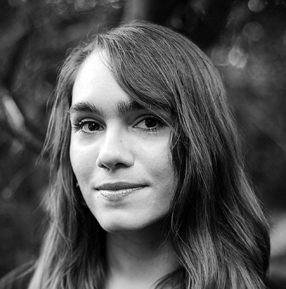There will be no stars—the poem has had enough of them. I think we can agree
we no longer believe there is anyone in any poem who is just now realizing
they are dead, so let’s stop talking about it. The skies of this poem
are teeming with winged things, and not a single innominate bird.
You’re welcome. Here, no monarchs, no moths, no cicadas doing whatever
they do in the trees. If this poem is in summer, punctuating the blue—forgive me,
I forgot, there is no blue in this poem—you’ll find the occasional
pelecinid wasp, proposals vaporized and exorbitant, angels looking
as they should. If winter, unsentimental sleet. This poem does not take place
at dawn or dusk or noon or the witching hour or the crescendoing moment
of our own remarkable birth, it is 2:53 in this poem, a Tuesday, and everyone in it is still
at work. This poem has no children; it is trying
to be taken seriously. This poem has no shards, no kittens, no myths or fairy tales,
no pomegranates or rainbows, no ex-boyfriends or manifest lovers, no mothers—God,
no mothers—no God, about which the poem must admit
it’s relieved, there is no heart in this poem, no bodily secretions, no body
referred to as the body, no one
dies or is dead in this poem, everyone in this poem is alive and pretty
okay with it. This poem will not use the word beautiful for it resists
calling a thing what it is. So what
if I’d like to tell you how I walked last night, glad, truly glad, for the first time
in a year, to be breathing, in the cold dark, to see them. The stars, I mean. Oh hell, before
something stops me—I nearly wept on the sidewalk at the sight of them all.
Copyright © 2019 by Leila Chatti. Originally published in Poem-a-Day on May 29, 2019, by the Academy of American Poets.
“I spent much of the last year unable to write. When I tried to listen to my interior, what I heard was a cacophony of accumulated voices telling me what a poem should be, what a poem should do—and, more disturbingly, what it shouldn’t. I began this poem as a genuine attempt to follow the rules I had internalized, but as I wrote the poem, I was interrupted by a strong urge to instead write about something that broke them—I wanted to write about the walk I took the night prior, in Madison, Wisconsin, and the brief, vital moment of joy that indicated my year-long depression might finally lift. I knew this risked sentimentality, earnestness, and vulnerability, things I had been told to guard against, but I was tired of the rules—I wanted to write the real thing, even if it wasn’t the ‘right’ thing. So I did.”
—Leila Chatti

